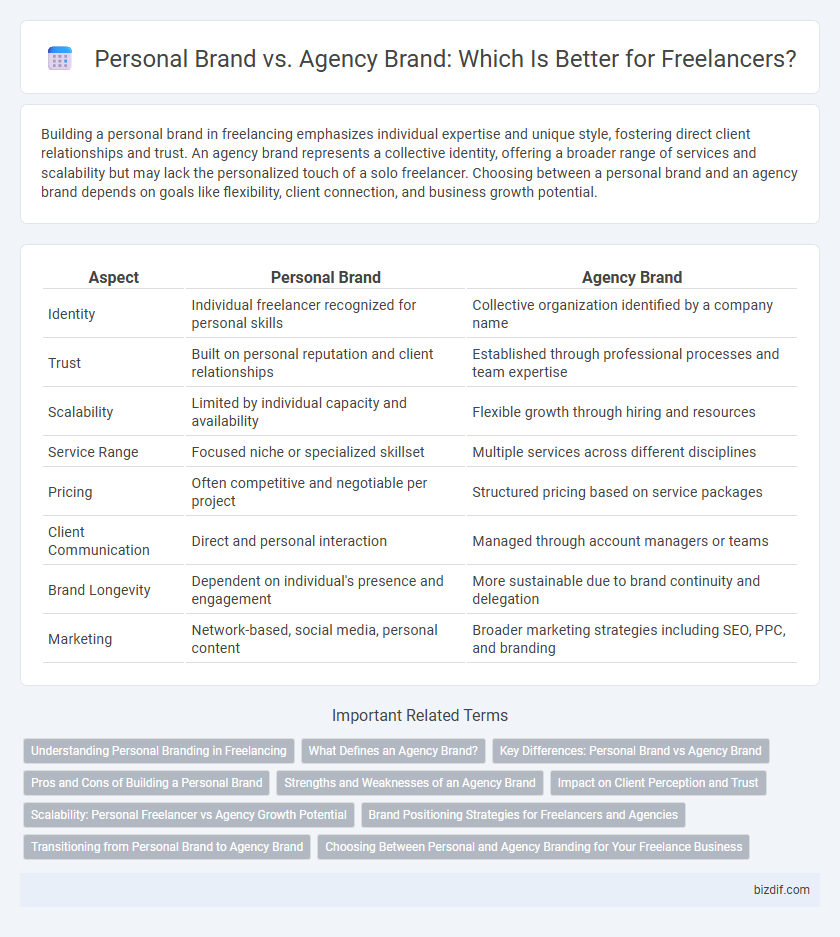Building a personal brand in freelancing emphasizes individual expertise and unique style, fostering direct client relationships and trust. An agency brand represents a collective identity, offering a broader range of services and scalability but may lack the personalized touch of a solo freelancer. Choosing between a personal brand and an agency brand depends on goals like flexibility, client connection, and business growth potential.
Table of Comparison
| Aspect | Personal Brand | Agency Brand |
|---|---|---|
| Identity | Individual freelancer recognized for personal skills | Collective organization identified by a company name |
| Trust | Built on personal reputation and client relationships | Established through professional processes and team expertise |
| Scalability | Limited by individual capacity and availability | Flexible growth through hiring and resources |
| Service Range | Focused niche or specialized skillset | Multiple services across different disciplines |
| Pricing | Often competitive and negotiable per project | Structured pricing based on service packages |
| Client Communication | Direct and personal interaction | Managed through account managers or teams |
| Brand Longevity | Dependent on individual's presence and engagement | More sustainable due to brand continuity and delegation |
| Marketing | Network-based, social media, personal content | Broader marketing strategies including SEO, PPC, and branding |
Understanding Personal Branding in Freelancing
Personal branding in freelancing revolves around showcasing individual expertise, values, and unique skills to attract clients directly linked to the freelancer's reputation. Unlike agency brands that emphasize collective services and scale, a strong personal brand fosters trust and personalized client relationships, leading to higher client retention and premium project opportunities. Effective personal branding involves consistent online presence, tailored communication, and demonstrating thought leadership within the freelancer's niche market.
What Defines an Agency Brand?
An agency brand is defined by its collective expertise, diverse team skills, and consistent service delivery that transcends individual contributors. It embodies a unified identity built through collaborative projects, client relationships, and reputation management. Unlike a personal brand reliant on one person's reputation, an agency brand emphasizes scalability, trustworthiness, and long-term client partnerships.
Key Differences: Personal Brand vs Agency Brand
Personal brands in freelancing revolve around individual expertise, personal reputation, and direct client relationships, fostering trust and authenticity. Agency brands emphasize collective skills, diverse service offerings, scalability, and often leverage a team-based approach to handle larger projects. Key differences include decision-making authority, brand identity control, and client engagement dynamics, where personal brands offer personalized service and agencies provide broader capabilities.
Pros and Cons of Building a Personal Brand
Building a personal brand in freelancing fosters direct client trust and showcases unique expertise, which can lead to higher client loyalty and premium pricing. However, reliance on individual reputation makes scalability difficult and poses risks if the freelancer becomes unavailable or changes careers. Limited capacity to delegate work compared to an agency brand may constrain growth opportunities and income stability.
Strengths and Weaknesses of an Agency Brand
An agency brand offers scalability and diverse expertise, enabling it to handle larger projects and deliver comprehensive solutions across multiple disciplines. However, agency brands often face challenges with personalized client relationships, as decision-making can be slower and communication less direct compared to personal brands. The reliance on team coordination in an agency increases operational complexity, potentially impacting flexibility and responsiveness.
Impact on Client Perception and Trust
Building a personal brand in freelancing fosters direct client connections through authenticity and individualized reputation, which enhances trust and perceived reliability. An agency brand offers a sense of stability and scalability, often reassuring clients with a broader resource pool and structured processes, impacting client perception with professionalism and consistency. Both branding strategies influence client trust differently: personal brands capitalize on personal expertise and relationships, while agency brands leverage collective experience and operational robustness.
Scalability: Personal Freelancer vs Agency Growth Potential
Personal freelancers often face scalability limits due to the direct correlation between their time and income, restricting growth potential to individual capacity. Agency brands leverage team collaboration and resource pooling, enabling larger project handling and diversified service offerings that drive exponential growth. Investing in an agency brand typically results in higher scalability and sustainable business expansion compared to a personal freelancer model.
Brand Positioning Strategies for Freelancers and Agencies
Freelancers build personal brands by showcasing individual expertise and cultivating direct client relationships, emphasizing authenticity and niche specialization. Agencies position their brand to reflect collective capabilities, scalability, and diverse service portfolios, appealing to larger clients seeking comprehensive solutions. Strategic brand positioning for freelancers centers on trust and personal connection, while agencies prioritize reputation, reliability, and broad industry impact.
Transitioning from Personal Brand to Agency Brand
Transitioning from a personal brand to an agency brand requires shifting the focus from individual expertise to collective capabilities, emphasizing team strengths and scalable services. Building a clear agency identity involves standardizing processes, expanding service offerings, and establishing consistent client communication to ensure reliability and professionalism. This strategic transition enhances market credibility, attracts larger clients, and supports sustainable business growth beyond the founder's personal workload.
Choosing Between Personal and Agency Branding for Your Freelance Business
Choosing between personal and agency branding for your freelance business hinges on your long-term goals and target audience. Personal branding fosters trust and authenticity by showcasing individual expertise, ideal for freelancers seeking direct client relationships and niche markets. Agency branding scales better for broader service offerings, collaborative projects, and building a team-oriented reputation that appeals to larger clients.
Personal Brand vs Agency Brand Infographic

 bizdif.com
bizdif.com